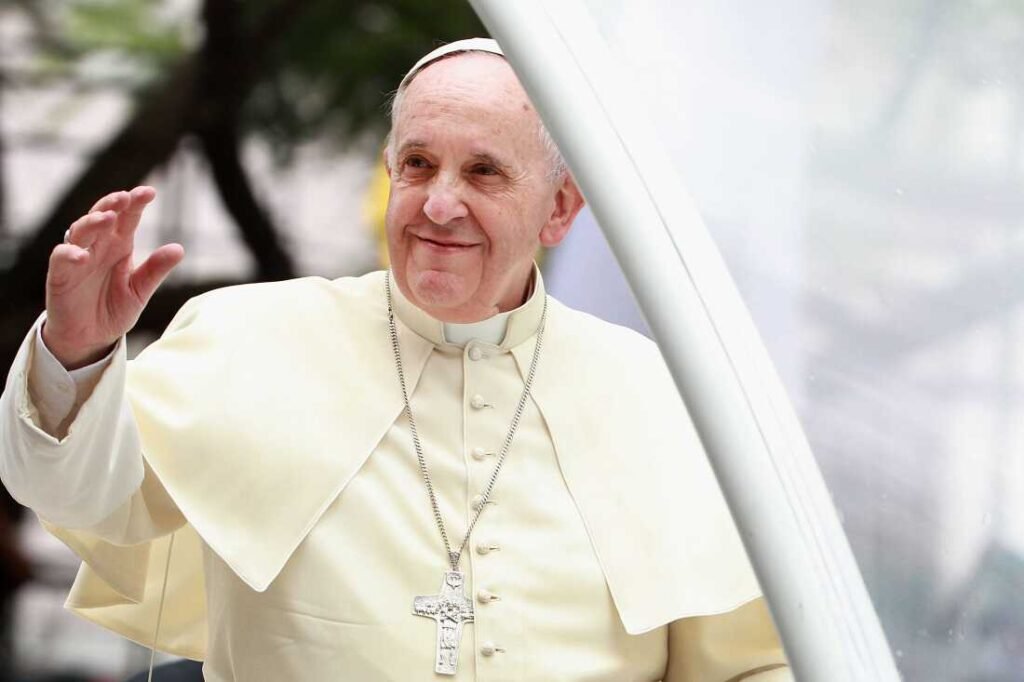
MANILA, PHILIPPINES - JANUARY 16: Pope Francis waves to thousands of followers as he arrives at the Manila Cathedral on January 16, 2015 in Manila, Philippines. Pope Francis will visit venues across Leyte and Manila during his visit to the Philippines from January 15 - 19. The visit is expected to attract crowds in the millions as Filipino Catholics flock to catch a glimpse of the leader of the Catholic Church in the Philippines for the first time since 1995. The Pope will begin the tour in Manila, then travelling to Tacloban to visit areas devastated by Typhoon Haiyan before returning to Manila to hold a mass at Rizal Park. The Philippines is the only Catholic majority nation in Asia with around 90 percent of the population professing the faith. (Photo by Lisa Maree Williams/Getty Images)
Vatican City, April 21, 2025 – Pope Francis, the spiritual leader of 1.4 billion Catholics worldwide, has passed away at the age of 88, the Vatican announced on Easter Monday. His death marks the end of a transformative 12-year papacy that saw sweeping reforms and a renewed focus on compassion, social justice, and Church accountability.
Cardinal Kevin Farrell, speaking on Vatican television, confirmed the pontiff’s passing.
“At 7:35 a.m. (5:35 GMT), the Bishop of Rome, Francis, returned to the house of the Father. His life was devoted entirely to the service of God and the Church,” Farrell said.
Just one day before his death, Pope Francis made a surprise appearance on the balcony of Saint Peter’s Basilica, smiling and waving to crowds gathered for the Easter Sunday celebrations—his final public appearance.
Ailing Health and Recent Hospitalizations
Pope Francis had battled several health issues over the past year. On February 14, he was hospitalized for bronchitis, which later developed into bilateral pneumonia. At one point, he was reported to be in critical condition and showing early signs of kidney failure. However, after several weeks of treatment, he briefly recovered and reemerged in public on March 23, greeting well-wishers from a hospital balcony.
He later returned to the Vatican for prescribed rest and continued limited engagements, including a meeting with U.S. Vice President JD Vance on April 19.
Funeral and Burial Arrangements
In keeping with his commitment to humility and simplicity, Pope Francis requested not to be buried in St. Peter’s Basilica, but instead at Santa Maria Maggiore Basilica in Rome—a church deeply important to him. He also rejected the traditional three-coffin burial, opting instead for a single casket made of wood and zinc.
This makes him the first pope in over a century to be buried outside the Vatican.
Legacy of a Transformative Pontiff
Born Jorge Mario Bergoglio in Argentina, Francis became the first Jesuit pope, the first from the Americas, and the first non-European pope in more than 1,200 years. He was elected to the papacy on March 13, 2013, at the age of 76, following the historic resignation of Pope Benedict XVI.
Francis inherited a Church facing deep crises, including global fallout from clerical sex abuse scandals and infighting within the Vatican Curia. Over the years, he worked to reform the Church into a more transparent and compassionate institution.
Key Achievements:
- Reorganized the Vatican bureaucracy
- Issued four major teaching documents
- Traveled to over 65 countries on 47 foreign trips
- Canonized more than 900 saints
- Convened five global synods to address pressing Church issues
- Appointed women to senior Vatican roles for the first time
- Permitted blessings for same-sex couples in specific pastoral settings
Despite criticism from both conservatives and progressives, Pope Francis remained steadfast in his efforts to bridge tradition with modernity. He championed the rights of migrants, advocated for environmental protection, and spoke out against economic inequality and war.
Next Steps: The Papal Conclave
With the passing of Pope Francis, the process to elect a new pope begins. A papal conclave—a secretive gathering of cardinals from around the world—will be convened 15 to 20 days after the pope’s death.
In the interim, Cardinal Kevin Farrell, the current Camerlengo, will manage Vatican City’s day-to-day affairs.
Pope Francis will be remembered not only for his spiritual leadership but also for his enduring efforts to humanize the papacy, bring the Church closer to the people, and courageously confront the challenges of the modern world.
For more news, subscribe to questiiqa.com







